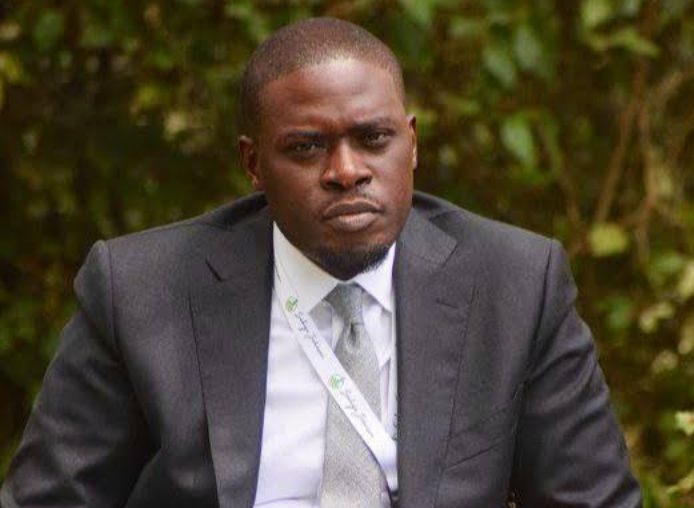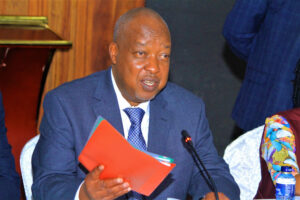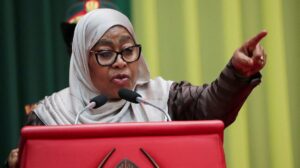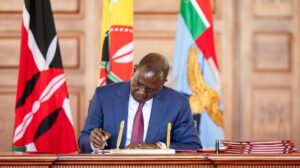Nairobi’s governance under Governor Johnson Sakaja has become a contentious issue, sparking widespread discontent among both local leaders and residents.
Prominent among these critics is Kileleshwa MCA Robert Alai, who has consistently voiced frustration over what he perceives as Sakaja’s prioritization of public relations exercises over critical service delivery.
Alai and other leaders argue that instead of addressing pressing issues like waste management, road maintenance, and healthcare, Sakaja has focused on high-visibility projects with little immediate impact on residents’ daily lives.
One recent example that has drawn criticism is the establishment of the Mama Lucy Eye Clinic.
Alai has openly condemned this project, calling it a PR exercise that is misaligned with the core needs of Nairobi residents.
He argues that while such facilities might be beneficial, they do little to address the fundamental problems facing the city, such as waste piling up on streets, poorly maintained roads, and inadequacies in the healthcare system.
For Alai, projects like the eye clinic symbolize Sakaja’s alleged emphasis on optics rather than the delivery of meaningful, tangible improvements for the city.
Financial management under Sakaja’s leadership has also been a key point of contention.
Alai and other critics have raised concerns about the lack of transparency in how Nairobi’s funds are managed and allocated.
While Sakaja has been visible in launching various initiatives, questions remain about the county’s actual revenue generation and expenditure. Critics claim that essential services are either delayed or underfunded, which points to potential inefficiencies or mismanagement.
For instance, many residents report that road repairs and other infrastructure projects are consistently postponed, while educational bursaries and community aid programs often face funding bottlenecks.
In light of these frustrations, Robert Alai and other leaders have formed a movement called Agenda 47, aiming to rally Nairobi’s citizens around a vision of improved accountability, service delivery, and transparency from their county government.
Agenda 47 is positioned as a citizen-led initiative to reclaim Nairobi from what Alai describes as a cabal that dominates the county’s decision-making process.
Through this movement, Alai hopes to mobilize Nairobians to demand a government that genuinely prioritizes their well-being and provides effective governance.
Agenda 47 underscores a broader dissatisfaction with the current administration, highlighting a call for a leadership that will prioritize basic infrastructure, safety, and healthcare over projects that appear to be designed primarily for public relations.
Another incident that has exacerbated criticism of Sakaja’s leadership is his perceived absence during times of crisis.
When a significant fire recently broke out in the Embakasi area, Sakaja’s absence was particularly noted, with his deputy stepping in to manage the emergency response.
Sakaja’s critics argue that this instance reflects a pattern in his leadership style, where he is often unavailable for immediate crises.
Sakaja’s frequent international travels have raised questions among residents and leaders alike, with many wondering if his focus lies beyond the borders of Nairobi rather than on the city’s pressing issues.
The discontent surrounding Sakaja’s leadership is not limited to isolated incidents; it reflects a broader sentiment that Nairobi deserves a more engaged and accountable administration.
Agenda 47’s emergence signifies a rallying point for those who feel that the current government has neglected the city’s core needs.
Through this movement, Alai and other leaders are calling on Nairobi residents to stand up for a more effective, transparent administration that prioritizes essential services.
They argue that what the city needs is not grandiose, attention-grabbing projects but solid, steady improvements in areas that directly impact residents’ quality of life.In summary, the growing criticism of Sakaja’s governance, led by vocal figures like Robert Alai, centers on a belief that Nairobi has been mismanaged and neglected.
Alai’s Agenda 47 is a response to what he describes as a culture of incompetence and misplaced priorities in Sakaja’s administration.
As frustrations continue to mount, Agenda 47 has become a platform for Nairobians to demand better governance, hoping for a leadership that values accountability and genuinely seeks to improve the city’s infrastructure, healthcare, safety and beyond Nairobi.





















Add Comment